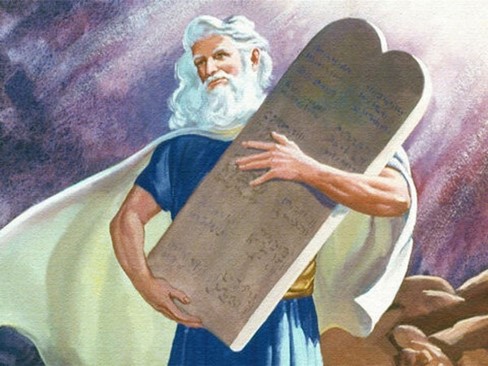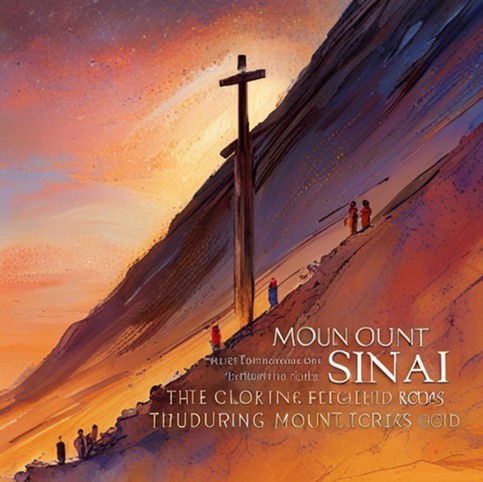Good morning!
Greetings in the name of the Father, the Son, and the Holy Spirit.
“God is spirit, and those who worship him must worship in spirit and truth.” – John 4:24

I invite you to journey back with me this morning. Close your eyes and imagine. You’re standing at the base of a massive mountain, its peak piercing the azure sky, shrouded in mystery and crowned with a heavy cloud. The air around you is electric with anticipation. The ground beneath you trembles with divine resonance. You’re surrounded by a sea of faces — faces etched with the weariness of an arduous journey, yet alight with hope and fear, awe and expectation.
This is Mount Sinai. You can almost taste the desert dust on your tongue, feel the searing heat of the sun on your skin. But then, a sudden chill sweeps across the plain as a thick cloud descends upon the mountain. A trumpet blast sounds, long and piercing, and the mountain quakes violently. You are not just a bystander; you are an active participant, standing with the children of Israel, experiencing the reality of a people on the precipice of divine revelation.
Open your eyes now. Here we are, thousands of years removed from that moment but invited into the same sacred story, standing on the threshold of understanding the heart of God as He communicates His commandments. Today, we ascend that ancient mountain, moving beyond the awe-inspiring theatrics to the heart of the matter — the divine commandments etched by the very finger of God. So, with hearts open and spirits receptive, let us scale the heights of Sinai together, exploring the first four commandments that shaped a nation and continue to guide us today.
God’s Prologue
Brothers and sisters, as we delve into our Scripture readings today, we are struck by an astonishing fact. This monumental divine discourse, containing the cornerstone of moral law, does not open with a list of prohibitions, stipulations, or edicts. Instead, it commences with a tender declaration of relationship. In Exodus 20:1-2, God’s voice resonates from the mountaintop, not to thunder down decrees, but to introduce Himself in the gentlest of terms, “I am the Lord your God, who brought you out of the land of Egypt, out of the house of slavery.”
This divine prologue reveals a relationship birthed in the crucible of suffering and the liberation that follows. It is not a relationship constructed on mutual benefit or contractual agreement, but one solidly built on the bedrock of God’s mercy, His power, His unfathomable love. The God we encounter here is not a detached divine figure, aloof and indifferent. He is not a celestial spectator idly observing the unfolding drama of human history.
No, He is a God intimately entwined with the struggles, the victories, the highs and lows of His people’s existence. He is a God who hears the cry of the oppressed, who sees the tears of the downtrodden, who feels the pain of the afflicted. He is not just the lawgiver; He is the liberator. He is the deliverer who parts seas, who topples tyrants, who breaks the shackles of oppression. In the midnight of despair, He emerges as the beacon of hope, a pillar of fire lighting the way to freedom.
And my friends, the beauty of this prologue does not remain confined within the annals of ancient Israelite history. It is not a dusty artifact to be admired from afar. It is as much a message for us today as it was for the multitudes at Sinai. For just as He delivered the Israelites from the physical bondage of Egypt, our God delivers us from the spiritual bondage of sin and death. Through His Son, Jesus Christ, we experience the ultimate Exodus – an Exodus from the land of sin to the realm of grace, from the dominion of death to the kingdom of life everlasting.
So, as we stand here today, let us marvel at the extraordinary nature of our God. Let us remember that before He lays down His law, He establishes His love. Before He outlines our responsibilities, He reassures us of His relationship with us. This is our God – a God who chooses to define Himself not by our transgressions, but by His transcendence, not by our failings, but by His faithfulness.

Commandment One: No Other Gods
As we step into the sacred heart of the Ten Commandments, we first encounter this divine decree: “You shall have no other gods before me” (Exodus 20:3). This statement was not merely the introduction to a set of rules; it was a revolutionary clarion call that marked a distinct departure from the cultural and religious landscape of the time.
The Israelites, emerging from the shadow of Egyptian civilization and on the brink of entering Canaan, were surrounded by societies teeming with deities. The Egyptians, the Canaanites, the Mesopotamians, each had a pantheon of gods to whom they offered worship. Yet, amidst this polytheistic milieu, the Israelites were being called to something radically different – a singular devotion, a focus, and faith in the One true God. The God who had revealed Himself to them, who had led them out of bondage, was to be their only God.
As we bring this ancient commandment into our contemporary context, we may find that the gods we contend with may not inhabit golden statues or sacred groves. They may not be called Baal, Ra, or Marduk. Instead, they are more insidious, more deeply woven into the fabric of our daily lives. They go by the names of wealth, power, fame, success, and self-gratification. These are the gods that vie for our attention, that seek to sit upon the throne of our hearts.
Jesus, speaking in the New Testament, reaffirms this commandment: “No one can serve two masters. Either you will hate the one and love the other, or you will be devoted to the one and despise the other. You cannot serve both God and money.” (Matthew 6:24). It’s a stark reminder that the call to singular devotion to God is as relevant today as it was at Sinai.
The Apostle Paul, too, echoes this commandment when he warns the Corinthians against idolatry (1 Corinthians 10:14). The idols may have changed over the centuries, but the danger remains the same. Anything that takes precedence over God in our lives becomes an idol, a false god that cannot satisfy, cannot deliver, cannot save.
Therefore, my dear friends, flee from idolatry. (1 Corinthians 10:14)
So, as we consider this first commandment, let’s ask ourselves: Who or what is seated on the throne of our hearts? Where do our loyalties lie? As the God of the Israelites called them to exclusive worship and devotion, so He calls us today. Let’s ensure that our hearts are devoted entirely to Him, that our service is to God alone, for He is the One true God deserving of our complete allegiance and love.
Commandment Two: No Graven Images
As we continue to explore the timeless wisdom of the Ten Commandments, we encounter the second commandment: “You shall not make for yourself a carved image” (Exodus 20:4). This commandment, on the surface, seems bound to an ancient context, addressing the physical idols that were ubiquitous in the Near East at the time. Yet, its depth extends far beyond the mere prohibition of idol making.
For the Israelites, this commandment was a bulwark against the attempt to diminish God, to reduce Him to human terms. This prohibition guarded the divine transcendence. The God they worshiped was not a deity to be confined within the parameters of human understanding or controlled by human manipulation. He was, and is, the God beyond all comprehension, infinitely greater than any earthly representation could encapsulate.
This commandment serves as a mirror reflecting the God who refuses to be contained or controlled by human definitions, by human images, by human conceptions. It was a commandment that protected the truth of God’s nature against human tendencies to limit, to define, to encapsulate the divine.
In our modern context, the idols we encounter may not be stone statues or golden calves, but this commandment is no less relevant for us. For we too face the temptation to create our own gods, gods that suit our preferences, that endorse our biases, that fit comfortably within our cultural, intellectual, or theological boxes. We can easily craft a god in our own image, one that mirrors our ideals, our aspirations, or even our prejudices.
The Apostle Paul, in his letter to the Romans, warns against this very danger. He laments that “they exchanged the truth about God for a lie, and worshiped and served created things rather than the Creator” (Romans 1:25). Similarly, in 1 John 5:21, the Apostle John cautions, “Little children, keep yourselves from idols.” These New Testament verses echo the timeless truth of the second commandment – God alone, as He has revealed Himself to be, is to be our object of worship.
The danger, dear friends, lies in the possibility of ending up worshiping our own ideas of God, rather than the God who is. We risk losing sight of the living God and worshiping a god of our own making. This commandment, then, calls us to humility, to the acknowledgment that God cannot be confined by our perceptions or preconceptions. It invites us to worship God as He is, in all His glorious, unfathomable mystery, not as we might want Him to be.
Commandment Three: No Misuse of God’s Name
Moving forward in our journey through the Ten Commandments, we arrive at the third decree, a sacred injunction concerning God’s name: “You shall not take the name of the Lord your God in vain” (Exodus 20:7). To fully appreciate the magnitude of this commandment, we need to step into the ancient Near East, where names carried profound significance.
In ancient cultures, a name was far more than a mere identifier. It represented a person’s essence, their character, and their reputation. This was especially true of God’s name. The name of God embodied His character, His promises, His power, and His very being. It held the weight of His divine reputation. To misuse God’s name, then, was to dishonor who He was. It was an affront to His character and a violation of the relationship He had with His people.
We must understand that this commandment extends beyond mere speech. It isn’t just about casual or irreverent use of God’s name in conversation, though that’s certainly part of it. This commandment penetrates deeper, touching our actions, our behavior, our lifestyle. It’s about the misuse of God’s name through the way we live. When our actions contradict God’s character, when we profess to be His people but live contrary to His ways, we bring dishonor to His name.
In the New Testament, the Apostle Paul echoes the spirit of this commandment when he admonishes believers in Romans 2:24: “The name of God is blasphemed among the Gentiles because of you.” Our actions as professed followers of God can either honor or dishonor His name. Therefore, this commandment urges us to live in a manner consistent with who God is and what He stands for.
The name of Jesus, too, is held in high regard in the New Testament. In Philippians 2:9-11, Paul writes: “Therefore God has highly exalted him and bestowed on him the name that is above every name, so that at the name of Jesus every knee should bow, in heaven and on earth and under the earth.” As followers of Christ, we bear His name. Our actions should reflect His character, His love, His grace, and His mercy.
As we reflect on this commandment, let’s remember its dual charge – to honor God’s name in our words and to honor it through a life lived in alignment with His will. In doing so, we contribute to the magnification of God’s name, enabling it to be held in reverence, thereby upholding the heart of this commandment.

Commandment Four: Sabbath Day
We arrive at the fourth commandment, a divine mandate often overlooked in the frenetic pace of modern life: “Remember the Sabbath day, to keep it holy” (Exodus 20:8). To fully comprehend the gravity of this commandment, we must step back into the sandals of the newly freed Israelites, who were not far removed from their life of relentless toil as slaves in Egypt. The Sabbath was more than just a day off; it was a divine gift, a radical reminder of their liberation.
For the Israelites, the Sabbath was a stark contrast to the grueling seven-day workweek enforced during their captivity. It was an invitation to pause, to breathe, to remember who they were — not slaves, but free people, children of the Almighty God. It was a day set apart for rest and worship, a day to delight in the Creator and His creation.
This concept of rest was not about idleness but a deep, rejuvenating peace, the kind that restores the soul. It was a rest rooted in the secure knowledge of God’s sovereignty, His providence, and His love. When we rest, we affirm our trust in God, acknowledging that He is in control and that our lives are in His hands.
In the New Testament, the notion of rest takes on an even deeper meaning. Jesus, our Savior and Lord, issues an extraordinary invitation in Matthew 11:28, “Come to me, all who labor and are heavy laden, and I will give you rest.” This is not merely physical rest. This is spiritual rest, rest for our weary souls, a soothing balm for our anxieties, burdens, and fears. It is in Jesus that we find true rest, a tranquility that surpasses human understanding.
In our society that often equates busyness with importance and productivity with worth, it’s easy to dismiss the Sabbath as irrelevant or impractical. Yet, God’s commandments are timeless, speaking to us across millennia. We are called to reclaim the sacredness of the Sabbath, to resist the culture of non-stop work and consumption, to rest as an act of faithful trust in God.
As we reflect on this commandment, let us ponder our own rhythms of work and rest. Are we honoring the Sabbath and keeping it holy? Are we finding our ultimate rest in Christ, laying down our burdens at His feet? Let’s remember that in the observance of the Sabbath, we not only obey God’s command but also accept His gracious gift of rest, acknowledging Him as the source of our strength and our peace.
Reflection on God’s Character
Our journey through the first four commandments has illuminated not just the heart of the law, but the heart of the Lawgiver, God Himself. His exclusivity, transcendence, holiness, and generosity are written into each commandment, painting a vibrant picture of His character. This depiction invites us into a deeper relationship with Him, characterized by singular devotion, reverence, and rest.
But what does it mean for us, today? How do these ancient commandments, carved into stone tablets, translate into our daily lives in a world so different from that of the Israelites at Sinai?
When we examine the first commandment, we are confronted with a divine exclusivity that challenges us to look critically at the “gods” we may have unconsciously allowed into our lives. Material wealth, success, fame, our careers, even our families can become idols when they occupy the place in our hearts reserved for God alone. The Apostle John’s caution rings clear today, “Dear children, keep yourselves from idols” (1 John 5:21). This commandment isn’t just about our worship, but about our affection, our loyalty, our ultimate devotion.
The second commandment invites us to reflect on our understanding of God. We live in a world where we are often encouraged to create a ‘god’ to suit our preferences and desires. Yet, the prohibition against graven images warns us against shaping God into our own image, into what we desire Him to be. Instead, we are called to worship God as He has revealed Himself in Scripture, in the person and work of Jesus Christ.
The third commandment about the misuse of God’s name extends beyond the words we speak to the lives we live. Our actions, attitudes, and behaviors either honor or dishonor God’s name. As Paul writes in Colossians 3:17, “And whatever you do, whether in word or deed, do it all in the name of the Lord Jesus, giving thanks to God the Father through him.”
Finally, the commandment about the Sabbath calls us to intentionally set aside time to rest and worship, a profound challenge in our ‘always-on’ culture. This is not about legalistic observance, but about creating space in our lives for God, about acknowledging our dependence on Him.
These commandments, while etched into stone centuries ago, continue to hold profound relevance for us today. They remind us of God’s unchanging character and His loving desire for relationship with us. His faithfulness endures, regardless of our waywardness. The commandments are not given for His benefit but for ours. They direct us to the One who is always worthy of our singular devotion, reverence, and love. Let us, then, live each day in light of His enduring love and faithfulness.

“Love the Lord your God with all your heart and with all your soul and with all your strength.” – Deuteronomy 6:5
